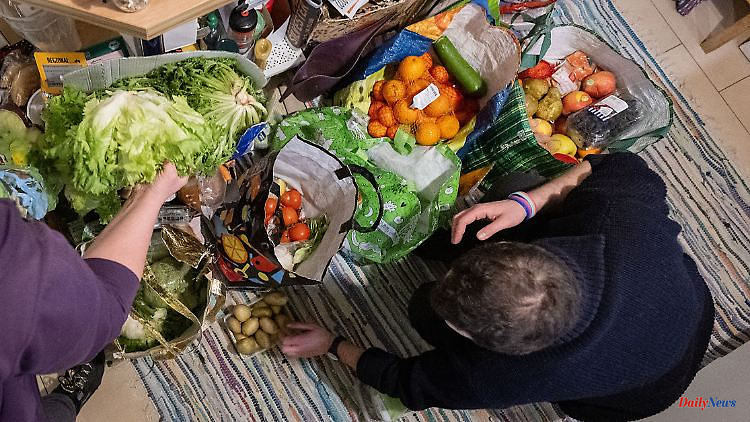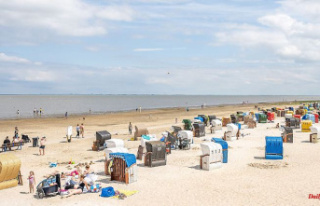In Germany, around eleven million tons of food are thrown away every year. Initiatives such as Foodsharing, the Tafel and Too Good To Go save the sorted goods from the garbage, but their work is a drop in the bucket. One measure would be much more effective.
Sandwiches, whole loaves of bread, vegetables and preserves are available for collection in a side chapel of the Church of St. Apostles in Frankfurt am Main - food that would have ended up in the garbage had not members of the Foodsharing association accessed it. Foodsharing is involved nationwide in the distribution of food that is still edible. To do this, the members pick up leftover and discarded goods from supermarkets or bakeries.
In Frankfurt, the number of volunteers is growing from week to week, as local club chairwoman Lisa Villioth says. There are currently around 840. With more than 160 companies there are cooperations for the collection of goods. The distribution runs through groups in social networks and through open refrigerators - like the one in the church in the south of Frankfurt.
Anyone can pick up groceries here, says Bettina Rupp, who oversees the project on the part of the parish. Most people come from the neighborhood. Villioth criticizes the handling of food. "The whole system is crazy," says the 35-year-old. She refers, for example, to the huge amount of food that regularly ends up in the garbage after the shops close - because a large selection of perishable goods is also offered until the last.
Foodsharing Frankfurt alone has saved more than 1,700 tons of food from being thrown away since it was founded nine years ago. At the end of last year, the organization listed the amount of 83,000 tons nationwide, in Switzerland and Austria since it was founded ten years earlier. "That's great," says Ulrich Jürgens from the Geographical Institute in Kiel about food sharing. The food is usually collected with a lot of love, says the professor, who researches food waste.
However, with millions of tons of food thrown away each year, it is a drop in the ocean. According to figures from the Federal Ministry of Food and Agriculture, around eleven million tons of food were thrown away in Germany in 2020. Most of it comes from private households, followed by trade and processing. Fruit, vegetables and bread in particular often end up in the bin.
The Too Good To Go (TGTG) platform brings bakeries, supermarkets and restaurants together with consumers. During the day, companies estimate how much is left later. Customers reserve a so-called Magic Bag via the app and pay a third of the original price. 17,000 partner companies and around 9.4 million users are registered on the platform.
There is no competition with the Tafel, says TGTG Country Manager Germany, Wolfgang Hennen. "At eleven million tons, there is enough for everyone." According to TGTG, together with companies and consumers, 23 million portions of food have been saved since it was founded in 2016. Jürgens considers this figure to be optimistic. As with food sharing or other initiatives, the food savers would also save themselves from shopping in another store. And Frankfurt Foodsharing Chairwoman Villioth says there are weeks when she doesn't go shopping at all.
The panels also save food from being thrown away. According to the Federal Association, they distribute 265,000 tons of it every year - and the trend is rising. There is no competition with food sharing, as there is an agreement that the food banks, which are aimed at poorer people who can afford little, have priority when it comes to donations, as a spokesman says.
Containers is what it's called when people take groceries out of supermarket dumpsters. There are no figures for this. Researcher Jürgens believes that the amounts involved are relatively small. It's often not about getting enough, but about "the idea of an adventurous, community event" with an anti-capitalist, consumer-critical attitude. Jürgens points out that food hygiene is a "noble good" - in the bin, edible food also comes into contact with rotting things.
The federal government is campaigning for exempting containers from punishment, and the federal states should implement it. Ricarda Heymann from Central Hesse, who fishes goods out of supermarket garbage once a week, thinks this initiative makes sense. But it would make even more sense to ban supermarkets from throwing away food. Heymann also criticizes overproduction and oversupply in retail, which led to the accumulation of waste.
There are no publicly available lists of how much edible food is thrown away in supermarkets - but it should be a lot, Jurgens also estimates. In France, major retailers and supermarkets have been banned from throwing away food since 2016 and must donate it. According to the Center for European Consumer Protection, the food banks there have had significantly more food available since then.












